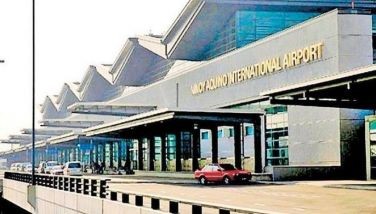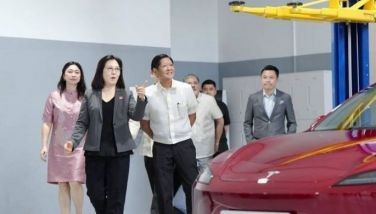Oil prices seen to drop on weak demand
November 6, 2001 | 12:00am
KUALA LUMPUR, Malaysia – Considering the current economic situation, oil prices are expected to drop further as the demand for the commodity continues to weaken.
In a speech to keynote the 7th ASEAN Council on Petroleum (Ascope) Conference 2001, Petronas chairman Tan Sri Dato Seri Azizan Zainul Abidin said "in the immediate term considering the slowdown of the economy and the prospect of a recession, we expect a weakening of the oil price." Petronas is the largest oil conglomerate in Malaysia.
The Petronas executive said, there is a need for further cooperation among the countries in the region.
"We hope the action being pursued by the oil producers to cut production and the measures taken by the government to deal with the recession will to some degree slow down the slide in demand for oil," he said.
He noted that in the longer term, the industry will need to factor more emphatically and decisively the shift of the centers of growth in oil demand from the developed to the developing countries.
"In the future, the industry should give more attention to the requirement of expanding market of the developing countries in their planning, logistics development, the sourcing of funds and the promulgation of the necessary legal framework to facilitate transshipment of crude and products," he said.
The Petronas chairman also underscored the need for consolidation of Ascope member countries in terms of developing new sources of energy. "We have also been seeing new supply sources being developed and progressive brought on stream. These new supplies will have to find markets either within their countries of origin or the international system," he said.
He said integrating and accommodating the expanded supply without compromising the economic viability of the industry would be a major challenge in the coming decades.
"It is important that this issue be recognized and preparations made to deal with the problems that may arise. This will be one of the new issues that will take center stage in future development of the industry."
With this, he said it is becoming increasingly evident that a new business environment is merging one that requires some fundamental change in he current thinking on the industry.
The Petronas chief pointed out that there are now several projects in the pipeline that would help develop business climate in the ASEAN oil industry.
"Several projects to meet future requirement have been explored including the proposal to construct several pipeline networks to transport oil and gas from the rich oil fields in Russia and to the markets in Asia and the Far East.
He also sees the need to focus on the commitment to safeguard and preserve the natural resources and at the same time adopt major developing in the information and communication technology to be able to cope up with the competition in the oil industry.
The Philippines is one of the founding members of ASCOPE when it was established on Oct. 15, 1975 in Jakarta, Indonesia. The country is being represented by the biggest oil company, state-owned Philippine National Oil Co. (PNOC), in the said influential regional oil industry group.
The other founding members are: Indonesia (Pertamina), Thailand (PTT), Singapore (SPC), and Malaysia (Petronas). There are at least four more countries that joined ASCOPE through the years. These are: Brunei (Petroleum Unit, PM Dept.), Vietnam (PetroVietnam), Myanmar (MOGE), and Cambodia (CNPA).
In a speech to keynote the 7th ASEAN Council on Petroleum (Ascope) Conference 2001, Petronas chairman Tan Sri Dato Seri Azizan Zainul Abidin said "in the immediate term considering the slowdown of the economy and the prospect of a recession, we expect a weakening of the oil price." Petronas is the largest oil conglomerate in Malaysia.
The Petronas executive said, there is a need for further cooperation among the countries in the region.
"We hope the action being pursued by the oil producers to cut production and the measures taken by the government to deal with the recession will to some degree slow down the slide in demand for oil," he said.
He noted that in the longer term, the industry will need to factor more emphatically and decisively the shift of the centers of growth in oil demand from the developed to the developing countries.
"In the future, the industry should give more attention to the requirement of expanding market of the developing countries in their planning, logistics development, the sourcing of funds and the promulgation of the necessary legal framework to facilitate transshipment of crude and products," he said.
The Petronas chairman also underscored the need for consolidation of Ascope member countries in terms of developing new sources of energy. "We have also been seeing new supply sources being developed and progressive brought on stream. These new supplies will have to find markets either within their countries of origin or the international system," he said.
He said integrating and accommodating the expanded supply without compromising the economic viability of the industry would be a major challenge in the coming decades.
"It is important that this issue be recognized and preparations made to deal with the problems that may arise. This will be one of the new issues that will take center stage in future development of the industry."
With this, he said it is becoming increasingly evident that a new business environment is merging one that requires some fundamental change in he current thinking on the industry.
The Petronas chief pointed out that there are now several projects in the pipeline that would help develop business climate in the ASEAN oil industry.
"Several projects to meet future requirement have been explored including the proposal to construct several pipeline networks to transport oil and gas from the rich oil fields in Russia and to the markets in Asia and the Far East.
He also sees the need to focus on the commitment to safeguard and preserve the natural resources and at the same time adopt major developing in the information and communication technology to be able to cope up with the competition in the oil industry.
The Philippines is one of the founding members of ASCOPE when it was established on Oct. 15, 1975 in Jakarta, Indonesia. The country is being represented by the biggest oil company, state-owned Philippine National Oil Co. (PNOC), in the said influential regional oil industry group.
The other founding members are: Indonesia (Pertamina), Thailand (PTT), Singapore (SPC), and Malaysia (Petronas). There are at least four more countries that joined ASCOPE through the years. These are: Brunei (Petroleum Unit, PM Dept.), Vietnam (PetroVietnam), Myanmar (MOGE), and Cambodia (CNPA).
BrandSpace Articles
<
>
- Latest
- Trending
Trending
Latest





























